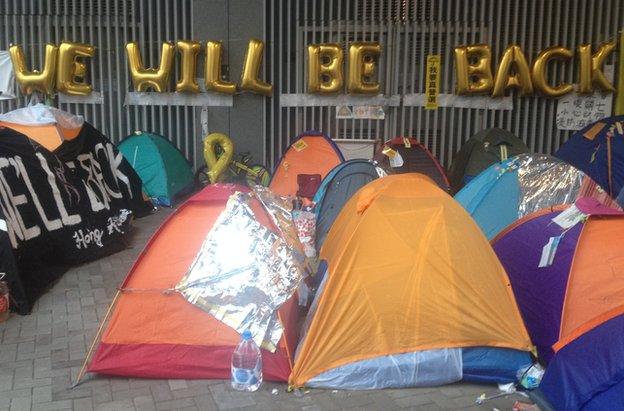Hong Kong protest camps: Who is still on the streets?
- Published
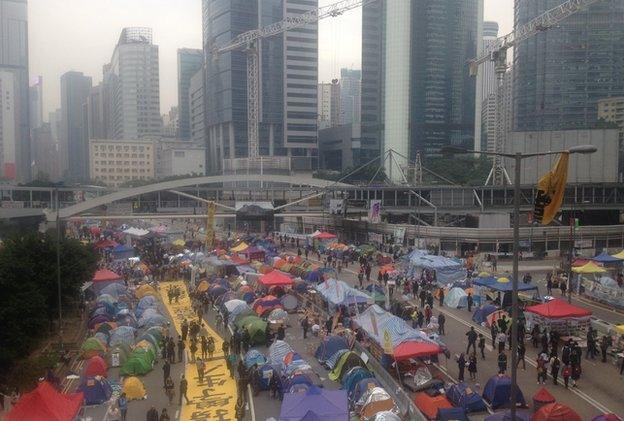
Hong Kong is bracing itself for a major operation to clear the largest of the pro-democracy protest camps that have been paralysing parts of the city centre for more than two months.
Thousands of police are expected to be deployed on Thursday morning to begin taking down the barricades in the Admiralty district and the authorities are warning protesters that they face "resolute action" if they resist.
Protester numbers have dwindled from their peak but - on the night before the end game begins - who are those that remain?

Uncle Chan, 68
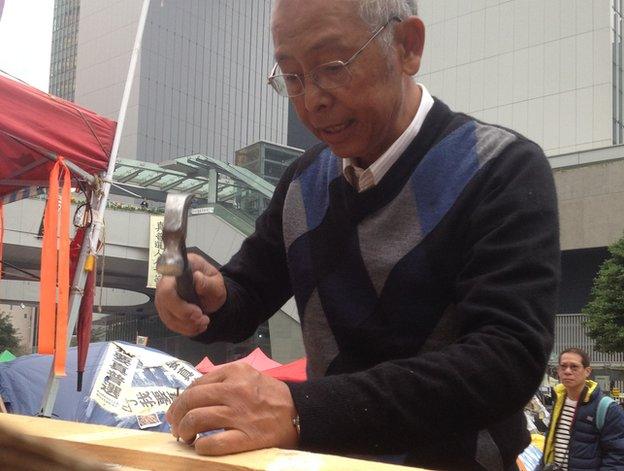
Before he retired, the 68-year-old worked in Hong Kong's garment industry. He has become a stalwart of the protest camp in the city's Admiralty district. He came out on to the streets on 29 September, the day after seeing students being pepper-sprayed and charged by police. It was a moment that galvanised many into supporting the movement.
On the eve of the anticipated clearance, Uncle Chan is still hard at work, repairing a set of wooden steps which allows protesters to cross over the central reservation - from the eastbound to the westbound section of the occupied highway.
"I don't care if this is the last day or the last minute," he says. "I'll be here as long as they need me."
Does he think it has all been worth it? "China's Communist Party is very powerful," he says. "But at least we have sent a message about our appetite and desire for democracy."
And he adds: "They've tolerated us for this long not because they wanted to, you know, but because the world has been watching."

Doug Lee, 20
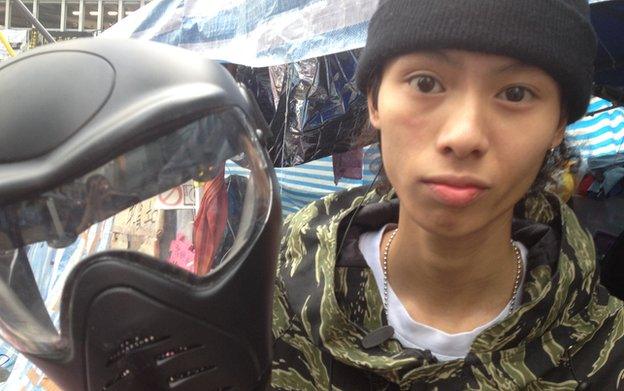
Doug Lee, a 20-year-old musician, has been sleeping in a tent at the main protest site since it all began. The movement has been largely peaceful but there have been sporadic outbreaks of violence. Doug is a veteran of pretty much all of them.
"The police attack us," he tells me. "We wear goggles but they're no defence against the batons."
And Thursday, when they come to tear down his tent? "We will stand back and try not to get hurt," he says. "But we won't run away either."
"The Chinese government keeps lying and lying and lying," he says. "We don't want to live under their control. We want to have our own system."
Does he think that Hong Kong will ever have the kind of democracy he's fighting for?
"I believe so, but it will take a long time," he says. "Maybe my children will get full democracy. If not, then my children's children."

Ms Leung
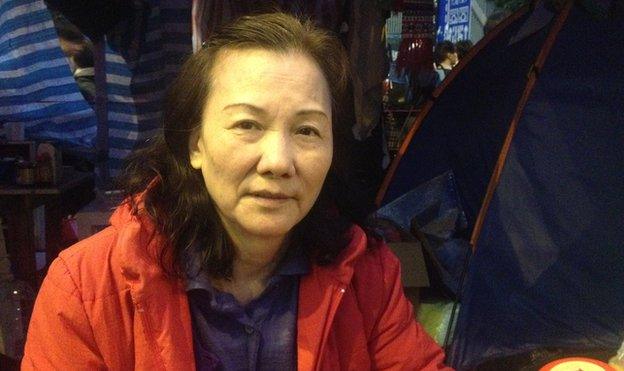
Ms Leung, who doesn't want to give her first name, is a retired supermarket sales-assistant. She's been coming to the main protest site every day.
She says she will go back home to sleep tonight but only because the student leaders say they prefer elderly people to leave in case of trouble when the clearance begins.
She is the mother of two grown-up sons and says part of her motivation is seeing how hard her children have to strive to make a living in Hong Kong.
"I'm here because I want to support the young people in their quest for universal suffrage," she says.
What will she miss most when it's all gone? "I will miss these days when we fight together and I will miss all the friends I've made here."
She's trying to hold back the tears now. "I'm a local Hong Kongese, born and raised, and I'm really touched by the spirit of these protests. I cried when I thought about having to leave here."
And she adds: "I've seen bloodshed but I hope there won't be any tomorrow."

Liona Li, 19
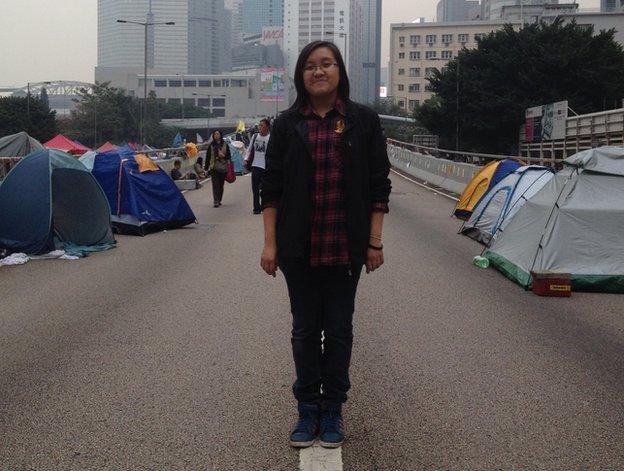
Liona Li is a 19-year-old university student studying social science. She's been sleeping out at the campsite since 10 October and has been there on the frontlines when violence has flared.
"I've seen it all," she tells me. "Tear gas, pepper spray, truncheons. One time I was hit by tear gas and couldn't see anything. I was at the front and had to be pulled away by a friend."
What will she do when the police come tomorrow morning? "It's a very difficult question," she says. "I don't know whether to stay and get arrested or not. I will know, I guess, when the time comes."
She says she will also miss the spirit of the protest camp, which now resembles a giant festival site in the midst of Hong Kong's skyscrapers. "It's a warm place. People share," she says.
Has it all been in vain? "The fight is not over," she replies, "only the occupation".
"Next year the Hong Kong legislature will pass the political reform bill and we will have more protests. And I will carry on. I will join the Hong Kong Federation of Students in helping to rally public opinion."

Roger Tsang, 65
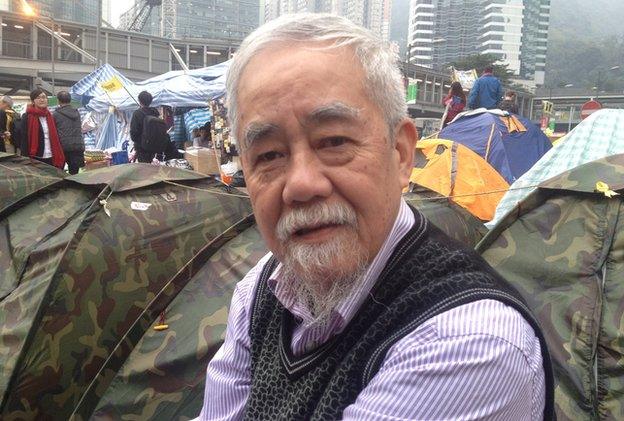
Roger Tsang is 65 years old and a retired, well, everything really. He's been a fireman, an entrepreneur, a taxi driver and a minibus driver. He's been coming to the protest site every day, for 70 days.
Why? "I'm here for democracy, for justice, for universal suffrage, for ideals and for morality," he tells me.
He will also return home to sleep tonight and is unsure if he'll make it back to see the end because the authorities plan to close the subway station.
But he, like everyone else I've spoken to, is sure the end will come. There may be some symbolic resistance but few expect it to do much other than delay the inevitable.
"Our movement will not be finished," Roger tells me.
"We can find another way. Actually, it's not a good thing to have been camping here for so long. If they clear us out tomorrow we'll find another way to get our voice across."
